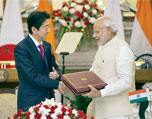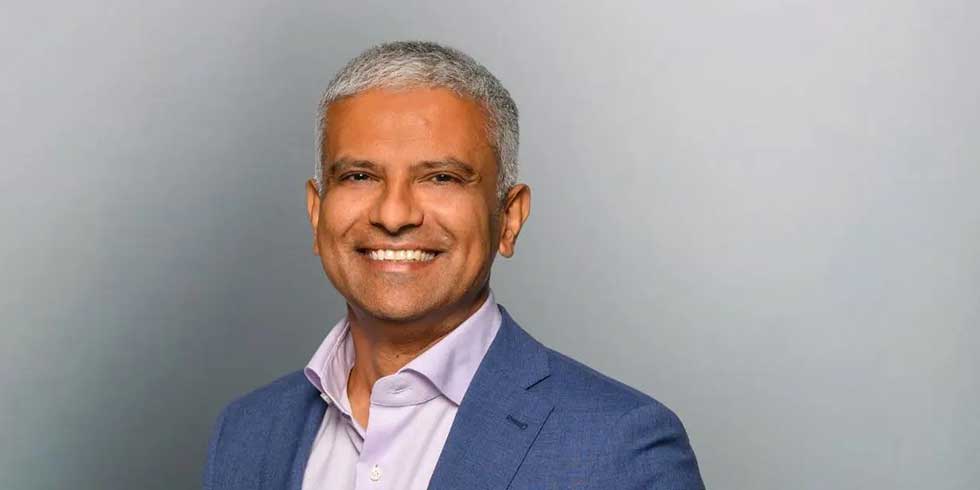Japan and India strengthened their military and economic ties Saturday, signing a high-speed-rail agreement and pledging joint exercises for their navies, as countries across Asia seek to counterbalance China’s growing assertiveness in the region.
Indian Prime Minister Narendra Modi and Shinzo Abe, his Japanese counterpart, signed the $15 billion rail pact, agreed to transfer technology to increase arms production in India and said Japan will be a stable guest at Indian-U. S. naval exercises. They also took a step toward an agreement on the use of civil nuclear energy.
Mr. Modi offered Mr. Abe—a fellow nationalist—support for his concerns over China’s land reclamation around small reefs in the South China Sea, which are also claimed by other countries in the region. Japan is also concerned that if China’s territorial ambitions go unchecked it could face more pressure in the East China Sea.
“The message is: We don’t want Chinese hegemony in Asia and we’ll work together to create a multipolar Asia,” said Sreeram Chaulia, Dean of the New Delhi-based Jindal School of International Affairs.
The alliance between Tokyo and New Delhi underscores how the two countries’ relationship can be mutually beneficial. India is hungry for investment to improve its infrastructure and increase industrial production and Japanese companies are looking to the South Asian nation’s fast-expanding economy to boost business.
The two nations’ relations are also free of historical tensions, which have in the past pre-empted cooperation between Japan and the countries it colonized or occupied before and during World War II, including South Korea and the Philippines.
In contrast, India and Japan were in the recent past brought closer by their aversion to the British.
Subhas Chandra Bose, a prominent Indian freedom fighter, sought Japanese help to liberate India from British rule during World War II. Afterward an Indian jurist sitting on the international military tribunal that heard Japanese war crimes trials after the conflict was the only one to judge that defendants from the east Asian country weren’t guilty.
India’s strong support for Japan and the stress in the two countries’ joint statement Saturday on the “critical importance” of the sea lanes in the South China Sea for regional security and trade, underscore the vital importance of the waters for Indian business: over half of all its exports travel across it.
Mr. Modi and Mr. Abe announced Japan will become a stable guest in the India-U. S. Malabar naval exercises off the coast of the South Asian country, as the countries seek to develop stronger capabilities to deal with maritime challenges in the Indo-Pacific region.
The joint statement published Saturday, which stressed security cooperation between Japan, India, the U.S. and Australia, reflects a containment strategy already agreed to by the U.S. and Japan, which envisions a string of nations around the Pacific checking China’s ambitions.
Worries about Beijing’s growing ability to deploy forces far from Chinese shores have helped drive a convergence of strategic thinking in Washington, New Delhi and Tokyo and prompted pledges of defense and economic cooperation.
The U.S. has challenged Chinese territorial claims in the South China Sea by sending its planes and ships to patrol near the artificial islands Beijing has built there. At the end of October a U.S. warship sailed within 12 nautical miles of one of China’s artificial islands.
Other agreements announced Saturday aimed to shore up the two countries’ relationship. The railway deal—which comes with financing valued at $12 billion on terms Mr. Modi described as “very easy”—represents a boon for Japanese business, which suffered embarrassing losses to China in bids for bullet-train contracts in Indonesia and Thailand.
The project will use technology developed to build Japan’s Shinkansen network—on which trains run at more than 300 kilometers an hour—and will be a welcome update to India’s vast but inefficient and overburdened railway network.
An energy accord with Japan would allow India to boost its nuclear-power production, easing international pressure for it to cut carbon emissions. The two countries stopped short of signing a deal, citing technicalities.
India needs nuclear technology to boost the energy supply to its fast-expanding economy, while keeping its carbon emissions—already the world’s fourth-largest—under control.
Japan, the only country to have suffered nuclear attacks, had sought assurances from India, which isn’t a signatory to the global Nuclear Non-Proliferation Treaty.
“I know the significance of this decision for Japan, and I assure you that India deeply respects that decision and will honor and respect its commitments,” Mr. Modi said.
In Japan, the left-leaning Asahi newspaper, which opposes Mr. Abe’s nationalist party, ran an editorial denouncing the deal. “Japan and the U.S. should be defending the nonproliferation regime. So long as they destroy its foundations with their own hands, the nuclear threat will only increase,” it said.
The mayor of Hiroshima, Kazumi Matsui, called the Japan-India agreement “extremely regrettable” and criticized Mr. Abe for not paying heed to a statement last week in which Mr. Matsui and the mayor of Nagasaki said a deal with India “could lead to a hollowing-out of the nuclear nonproliferation regime.”
India, Japan Strengthen Ties With Industrial, Military Agreements








Add Comment